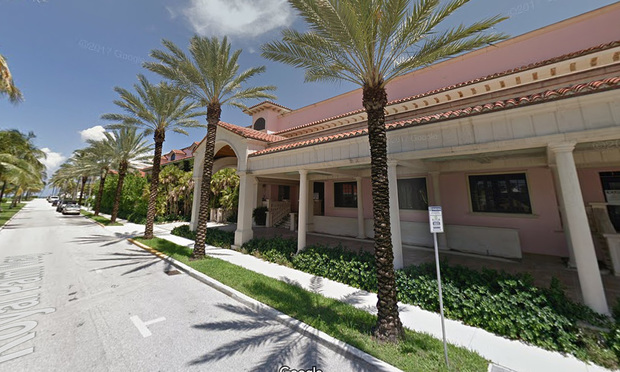 160 Royal Palm Way in Palm Beach. Credit: Google.
160 Royal Palm Way in Palm Beach. Credit: Google.
Taxpayers will foot some of the legal bills of a onetime millionaire Connecticut and Florida developer who pleaded guilty in a real estate fraud case and who now says he can't afford to pay his lawyers.
U.S. District Judge Victor Bolden in Bridgeport, Connecticut, approved paying Robert Matthews' private attorneys with public funds retroactive to April 2018, shortly after Matthews was indicted for scamming foreign investors out of millions of dollars in connection with a hotel-condominium project in Palm Beach. Bolden's ruling came Aug. 12.
It's another chapter in Matthews' fall from grace. The 61-year-old Palm Beach resident oversaw multimillion-dollar real estate projects, vacationed on his island property on Nantucket, Massachusetts, and enjoyed life aboard a 150-foot yacht.
Matthews' lawyers, David Ring and Paul Tuchmann, of the New Haven firm Wiggin and Dana, have been paid $50,000 to date. Matthews arranged for undisclosed "third parties" to pay their retainer, according to the judge's ruling.
Bolden said any of the lawyers' expenses over the $50,000 will be covered by public funds under the federal Criminal Justice Act, which pays legal fees for indigent defendants. The act limits Ring's fees to $140 an hour and Tuchmann's fees to $90 per hour.
"He currently does not have the funds necessary to pay for Mr. Ring and Mr. Tuchmann's services according to his retainer agreement, and does not have the income necessary to obtain such funds in the foreseeable future," Bolden wrote in his ruling.
It's not clear yet how much public funding the lawyers will get, and financial records supporting Matthews' request for public funding are sealed from public view.
In a filing in his pending Chapter 11 bankruptcy reorganization case in July, Matthews' bank records showed he had about $2,890 in income from April 1 to June 30, about $2,830 in expenses and his account balance was $178.
Ring declined to comment on the public legal funding. No one answered a phone listing in Palm Beach for Matthews, who formerly lived in the small Connecticut town of Washington.
White-collar criminals often have no choice but to seek public funding for their defense, because authorities freeze their bank accounts and other assets to secure restitution for victims, said Erica Hashimoto, a Georgetown University law professor and former federal public defender.
Matthews pleaded guilty in April to money laundering and tax offenses in connection with development of the Palm House Hotel. Prosecutors say he bilked foreign investors of millions of dollars by making attractive but false promises of celebrity and politician involvement in the project.
Authorities say he moved investor funds through banks in Connecticut and Florida and used the money to pay his and his wife Maria's credit card debts, and to purchase properties in Washington, Connecticut.
A sentencing date has not been scheduled. Matthews faces the possibility of years in prison. He's also being sued by the victims.
Maria "Mia" Matthews, an actress, pleaded guilty to tax evasion in the case. Matthews' brother and a Florida contractor also have pleaded guilty.
Law enforcement officials previously showed interest in Matthews in connection with two corrupt Connecticut politicians, but Matthews wasn't charged in either case.
In a 2004 criminal case, a defendant who pleaded guilty said he was the front man for Matthews when Matthews bought a Washington, D.C., condo from former Gov. John Rowland for more than twice the going rate. Rowland resigned in 2004 amid a corruption scandal that sent him to prison.
In the early 1990s, authorities questioned Matthews about a $25,000 payment to Waterbury Mayor Joseph Santopietro, who also was convicted of corruption and served prison time.
Dave Collins reports for the Associated Press.
© Touchpoint Markets, All Rights Reserved. Request academic re-use from www.copyright.com. All other uses, submit a request to [email protected]. For more inforrmation visit Asset & Logo Licensing.






